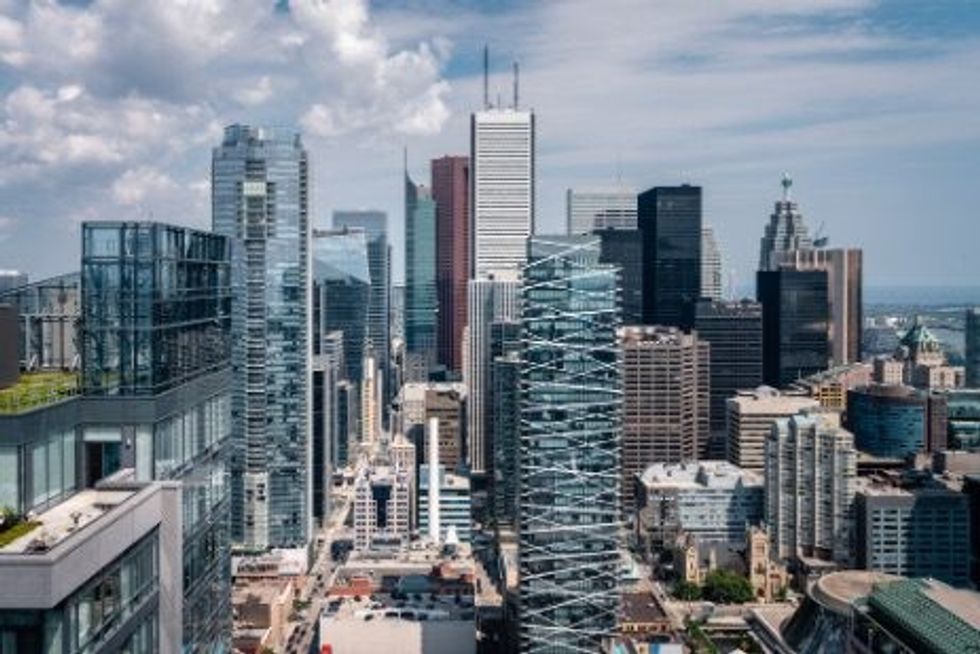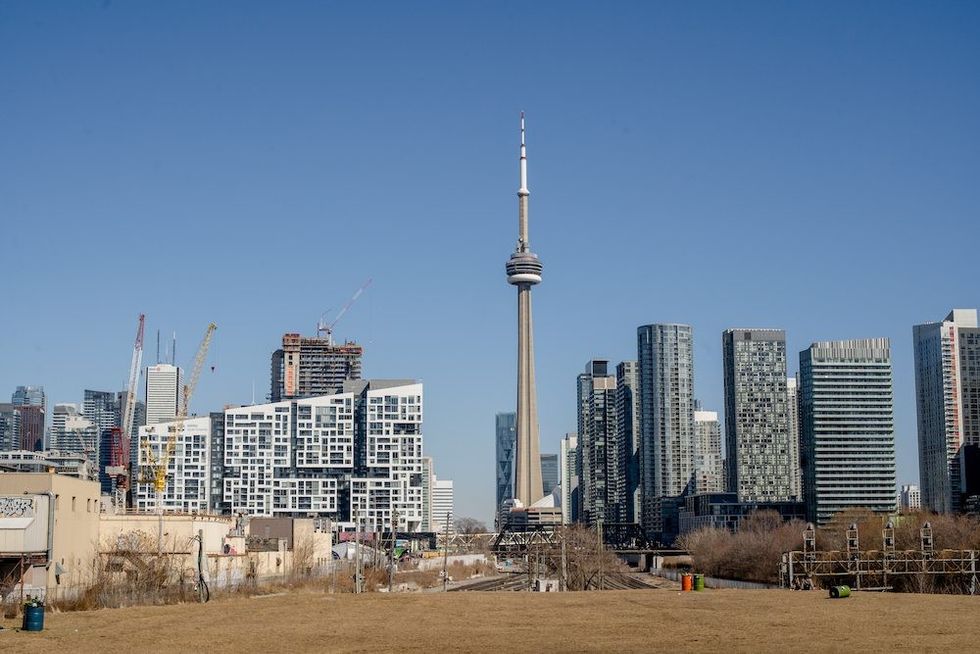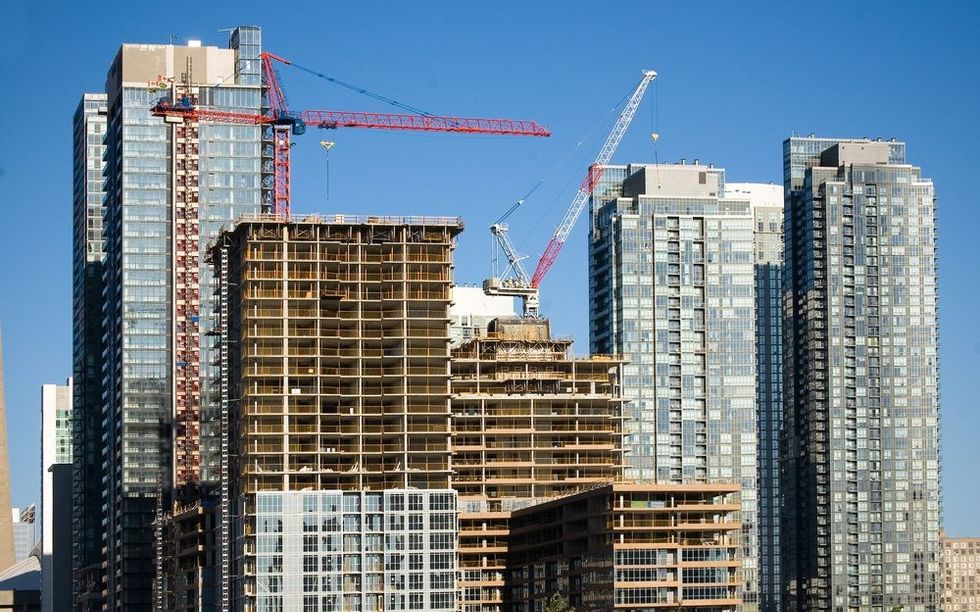With a loud and clear mission to urgently change the status quo, Toronto mayoral candidate Mitzie Hunter has some big goals on the housing front.
At front and centre to this agenda is a thorough five-point plan, which Hunter released earlier this month. A key element includes creating a new City Affordable Housing Corporation (TAHC).
While Hunter has evolved the plan in the weeks since its release, its backbone -- in a nutshell -- includes unlocking public lands for new affordable housing, encouraging more multiplex housing, adding rental apartments on major streets near campuses, speeding up building approvals and construction, protecting renters with things like a Tenant Advocate, and saving affordable housing.
The Urgency
We need more housing now, says Hunter. Unlocking public lands for below-market ownership opportunities and rental apartments involves building housing on every City-led development, she stresses. This means libraries, community centres, subway and LRT stations, and Green P parking lots. “On day one, I will proclaim that there’s no such thing as 'surplus land' in the City of Toronto portfolio,” says Hunter. “The TAHC will act with urgency to oversee unlocking those lands for affordable housing. We will begin identifying those projects right away.”
Like other candidates vying to replace John Tory as mayor, Hunter reiterates that Toronto is in a housing crisis -- there’s no sugar-coating it. “Buying a home in Toronto is now out of reach for all but the wealthiest,” she says. “Average rent for a one-bedroom apartment is up 22% to $2,500 a month, far beyond the reach of many people. The only way out of this mess is to add more affordable housing to meet demand and lower price escalation for renters and buyers alike.”
In developing her plan, Hunter says she drew on her experience as CAO of Toronto Community Housing prior to being MPP for Scarborough-Guildwood and a senior cabinet minister. “My main thing I thought about when drafting the plan was that young person who grew up here, goes to school, gets their dream job, and is starting their life, but really can’t afford to build a life here,” says Hunter. “We can’t be that city, because we need to keep that talent here. We need to be a magnet continuously for immigration, but also ensure that people who grew up here and go to school and start working can live here and see themselves living in the city.”
Hunter says that what sets her plan apart from other candidates is that it will provide more housing units that are affordable, unlocking public land – “and keeping it public, not selling it off to developers.”
She stresses that people will always need to live here in our city. “The city needs to be a builder, the designer, and it has to retain those housing units,” she says. “My plan is the most comprehensive and delivers more housing faster in terms of quickly building those units -- 108 projects within in Phase One, which is six years. There’s also homeownership. None of the other candidates have homeownership as an option as well.”

The TAHC
The new TAHC will be responsible for the development on public land of purpose-built, below-market rate rental apartments and affordable ownership units in buildings of between 10 and 20 storeys. These, says Hunter, are suitable for small and medium sized lots across the city. Hunter says it will deliver a Phase One goal of starting 12 buildings in year one, 24 in year two, 30 in year three, and 42 in year four, for a total of 108 projects, with the target of delivering nearly 22,700 units by the end of year six. This will provide housing for approximately 53,650 people.
Hunter says it will also deliver more affordable rental units than any currently announced plan, including Housing Now: 5,660 units will be set at 100% of AMR (25% of all units), 3,468 units will be set at 80% of AMR (15% of all units), and 2,108 units will be set at 405 of AMR (9% of all units). The TAHC will build 5,320 purpose-built market rental units (23% of all units) subject to annual rent control limits.
Hunter says she will provide the only affordable ownership opportunities of any announced plan by building 6,136 “shared equity” purchase units (27% of all units). These units will be sold at 50% of market value, with 50% retained by the TAHC. When a unit is sold, 50% of the appreciated value is retained by the TAHC to reinvest in future projects. It will ensure projects include on-site retail and on-site community space and add 17 acres of new public parks and green space across 68 TAHC developments. By the end of the first phase, the plan will generate total earnings greater than the original City contributions, allowing the TAHC to invest in more affordable housing projects on an on-going basis, according to Hunter.

The Missing Middle
Central to Hunter’s plan is a gentle increase in density by filling the “missing middle” in Toronto neighbourhoods typically reserved for single-family homes. The idea is to enable and encourage Montreal-style multiplexes of up to four units on every residential lot in the city as of right, removing the need to seek slow and expensive variance approvals.
Hunter says the City will provide up to $100K in forgivable low-interest loans for the cost of renovations or additions to create multiplexes. Modelled on the City’s Housing Initiatives Laneway Suites program, the annual payment will be forgivable every year that the unit is rented at below-average rent, she says.
If Hunter becomes mayor, she says the City will also develop standardized designs for laneway and garden suites of various sizes to expedite approvals, and review other City policies that can preclude yellowbelt development. “We will also review opportunities for laneway and garden suites on Toronto Community Housing properties,” says Hunter.
More Housing on Major Streets and Near Campuses
Hunter wants to revamp Toronto’s major streets with wide sidewalks, tree-lined boulevards, and shops and amenities within walking distance. “This is only possible with greater density,” says Hunter. The City would permit apartment buildings of up to eight storeys along the more than 1,200 km of Toronto roads that are deemed to be “major streets” and also in new student housing zones, while continuing to identify opportunities for greater density, according to Hunter.
She says she will create more permissive zoning in areas around postsecondary campuses, including greater flexibility for dedicated student residences. The plan is to take a page from Vancouver's book and work with the province to enable rental-only zoning tools.
Speeding Up Approvals
Hunter says she would hire 15 more city planners and expedite development application reviews to get new housing approved faster. She says she would speed up approvals by reviewing the City’s design guidelines and heritage designations that are used to slow or thwart new development. The plan includes making public consultations for housing projects more accessible and reflective to Toronto residents through social media outreach, online meeting options, and surveys that remain open for consultation.
To discourage unacceptable delays, Hunter's council will work with the Province to introduce a tax on speculators with land and approved building permits. “We will make the Open Door program permanent, fast-tracking planning approvals for affordable housing,” says Hunter.
Protecting Renters and Saving Affordable Housing
“We’re taking immediate steps as well as medium and longer term,” says Hunter of Toronto’s rental crisis. She's particularly concerned about society's most vulnerable. Hunter wants to empower non-profit housing providers, co-ops, and land trusts to aggressively increase their portfolios. “Provide for the next two years a $50M annual increase for the Multi-Unit Residential Acquisition program drawn from the Land Acquisition Reserve to support the purchase, renovation and operation of rental properties by non-profit housing providers, co-ops and land trusts,” reads the plan.
Hunter would also ensure 20% of projects are dedicated to Indigenous housing organizations. Under her watch, the City would create a rapid deployment deposit program to enable purchases with the same speed as the private sector. The program, says Hunter, helps save apartment buildings and multi-tenant houses that are either vacant or at risk of conversion to less affordable housing, while the City works to prevent demolitions of existing rental buildings. Hunter’s plan also involves expanding the Eviction Prevention in the Community (EPIC) Program, which supports vulnerable rental households to maintain their homes, by adding six new positions.
Furthermore, Hunter plans to triple the Toronto Rent Bank to $15M per year and create a Tenant Advocate role in the Legal Services division to help tenants fight illegal rent increases and fraudulent evictions. She would also ensure all rentals on City land are subject to annual rent control limits and advocate to the Province to bring rent control back to all units. The City would also add 15 more building inspectors to increase building code monitoring and fines for property standard violations in condos and apartment buildings, including elevator and appliance repair, temperature control and pests.
“People are calling me who are at risk of losing their rental,” says Hunter. “Let’s not create more homelessness.”
The Path Forward
Hunter keeps sprinkling new details into her comprehensive plan, which she says trumps that of her fellow candidates. This week, she expanded on her affordable housing plan by issuing satellite libraries and public health facilities at sites developed by her new Toronto Affordable Housing Corporation. New affordable housing developments need to be complete communities with Toronto Public Health and Toronto Public Library services, the mayoral candidate says. This would involve 74 new satellite offices.
“All candidates continue with the failed status quo options,” said Hunter at a press conference earlier this week. “The majority of their units are market units and are unaffordable condos. The majority of their units are one-bedroom and they’re not family-friendly. My buildings are more affordable units for buyers and renters alike – more than any other plan – in greener, family-friendly buildings, with more parks, recreation spaces, and playgrounds that fit the character of the city.”
Today, she announced a plan for integrated family-friendly communities that include more childcare and library facilities. And she isn't stopping on her mission for meaningful change as we lead up to the June 26 election -- and beyond, if she wins (and even if she doesn't, frankly).
“We’re not going to wait for other governments, developers, or anyone else,” says Hunter. “The City is going to get moving right away -- we can’t afford not to. Toronto is at a turning point and it can’t get to a breaking point. When you think about the young tech worker who I spoke to; she and her family are faced with the prospect of leaving the city they love. We can’t afford a hollowing out of our city and its talent. This is an urgent crisis and I hear it everywhere I go across Toronto.”






















